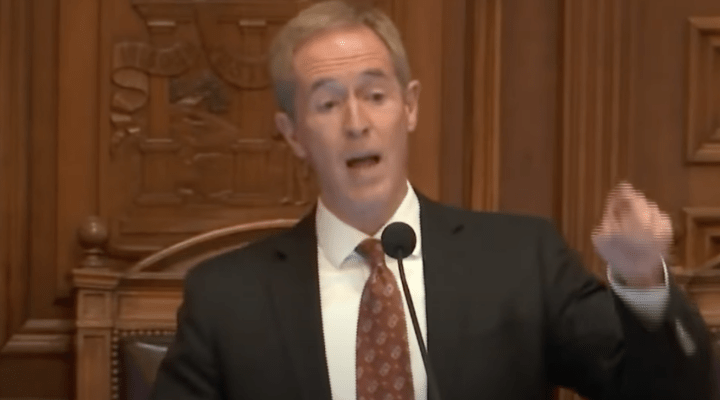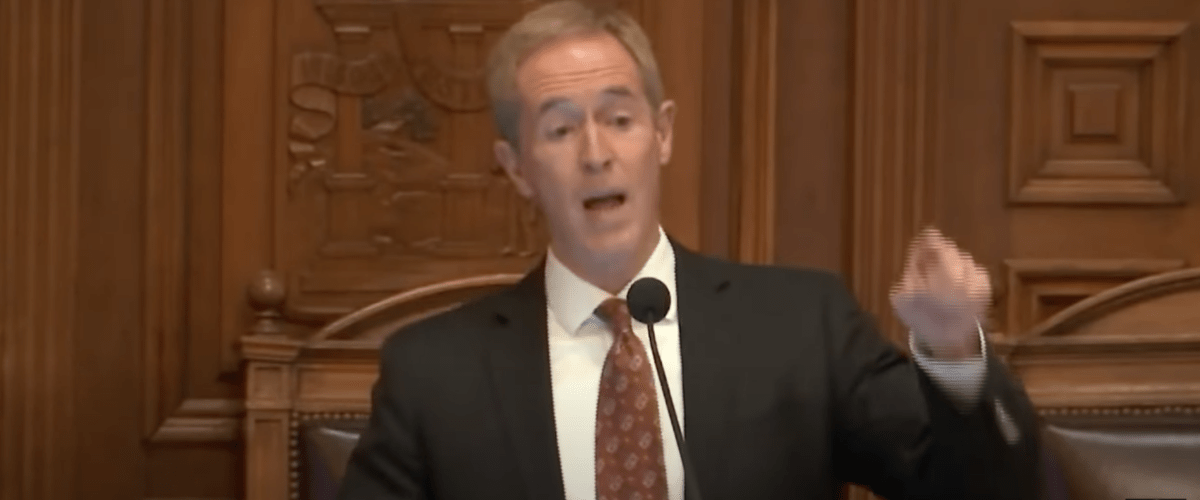The Georgia House of Representatives invited megachurch pastor Andy Stanley to speak to them as chaplain of the day March 15, and the message he dropped on them could have come from an Old Testament prophet.
Stanley, who has been a noted pragmatist in growing the 10-campus constellation of North Point Church, told the legislators to stop sowing division just to raise money and win elections.
The way for Georgia to become an “awesome” state, he declared, is for legislators and citizens to stop sowing division and instead seek unity.
“Disagreement is unavoidable, but division is always a choice,” Stanley said, “and the state that figures that out is going to be amazing.”
“Disagreement is unavoidable, but division is always a choice.”
Earlier, he said: “Organizations and states are never better than their leadership, and that’s why you’re doing what you’re doing. And when leadership is divided, things aren’t amazing.”
Andy Stanley is the son of Charles Stanley, a two-time president of the Southern Baptist Convention and an internationally known television preacher. The younger Stanley launched North Point Church in 1995, and today it is one of the largest churches in America. Andy Stanley has been cited as one of the 10 most-influential pastors in America.
The Georgia General Assembly, with 236 members, is one of the largest legislatures of any state in America. It also stands at the center of the deepest divisions troubling American democracy today, with a Republican majority that has largely supported former President Donald Trump’s lie about fraud in the 2020 presidential election. The Georgia General Assembly also has been caught up in controversial social issues, such as Critical Race Theory, access to the ballot, and bills related to gender and sexuality.
Against this backdrop, Stanley stood before the House of Representatives and delivered a scolding sermon against political opportunism.
“You can raise more money when people are divided and sure that the other group is out to get them.”
“Division creates complexity, complexity creates inefficiency, and inefficiency creates uncertainty,” Stanley said. “Uncertainty drives people to their what’s-in-it-for-me corners. Now, unfortunately, in your world there are advantages to division. You can raise more money when things are divided. … You can raise more money when people are divided and sure that the other group is out to get them. Politically speaking, fear of the other party is an asset. Division makes it easy to demonize and mischaracterize the other folks, so unfortunately, we’re used to fear and demonization, and disunity is to your advantage.”
Stanley called legislators to a better way. “What if we as a state decided we’re not gonna do that anymore? And you could decide that because unity is a decision.”
Then he warned: “To those of you who pander to and foster division, you are terrible leaders, and let me tell you why. … If you need an enemy in order to lead, you’re a poor leader.”
Being a pastor, he is obligated to speak a word for Jesus, Stanley said. “This is something I learned from Jesus … Jesus says this is important: Just because somebody considers you their enemy, you do not have to return the favor. Just because somebody considers you their enemy, you do not have to take your cues from your enemies and call them or treat them like an enemy.”
“If you need an enemy in order to lead, you’re a poor leader.”
He called on legislators to avoid a trait called “fundamental attribution error,” which he defined as “when I ascribe to you and to your behavior character issues but when I do the same thing, I justify what I’m doing based on the fact that there were circumstantial issues.”
This leads to blanket assessments of the other side, he explained. “It sounds like this: The corrupt Democrats and the racist Republicans.”
Yet the legislators know this isn’t true, he continued. “What if in the state of Georgia we just stop using that language?”
The truth is that people with different viewpoints respond differently, not that everyone on their other side has a character flaw, Stanley said.
He urged the politicians: “When someone with a microphone starts ginning up the crowd with all that crap, you know, don’t clap, don’t say amen, don’t get caught up in it, don’t approve of divide-them-up-and-keep-them-scared leadership. Just walk out. And better than walk out, walk toward the middle because the middle is where the problems are solved. You know that the messy middle is where the problems are solved but to walk toward the messy middle, we all have to get out of our Republican and Democrat bucket … and that’s not popular.”
In case the legislators think a pastor couldn’t possibly understand the political realities of the day, Stanley reminded them that one location of his congregation meets in heavily conservative Forsyth County and another meets in the more liberal Atlanta suburb of Decatur.
“I understand this,” he said. “It’s like two different countries.”
Yet success — making Georgia “amazing” — will only happen in the middle, Stanley emphasized.
“Do you love the state of Georgia more than you love your party? If not, maybe you should do something else.”
“I understand, but not as well as you do, it is hard to raise money in the middle. It’s hard to get people angry enough to vote in the middle. It’s hard to get people to turn out and vote if you’ve not made them afraid of their enemy. … It’s hard to do what you do if you don’t play this silly game, and I just wish we would stop with, ‘Oh no, we’re losing, we’re losing, we’re losing.’”
In politics, Stanley said, “the goal is to always appear as if you’re losing but not to actually lose. What a terrible way to lead. What if we just stop with all that and when we catch each other doing that, we call each other out.
Sitting in political rallies where such divisive rhetoric is used, he challenged partisans to say, “Even though I’m in your party, even though I’ll probably vote for you, I’m not buying it and I’m not going to respect it by clapping for it.”
Taking such a stand “requires a lot of personal maturity and personal security. To lead from the middle, it will require you to love our state more than you love your party. Do you love the state of Georgia more than you love your party? If not, maybe you should do something else.”
Related articles:
Seminary identifies top American preachers
Religious coalition files suit to stop Georgia’s new voter law


